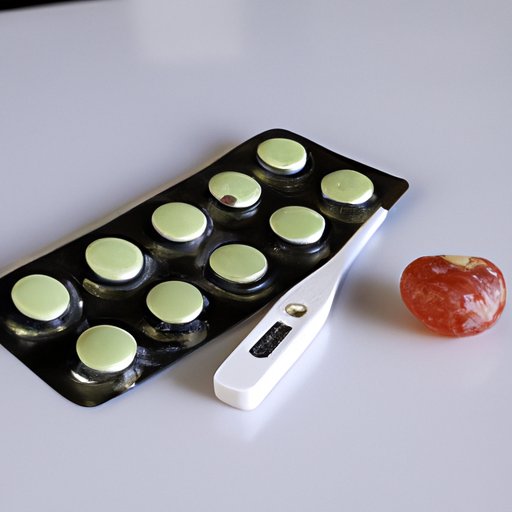
Introduction
Heartburn is a condition that affects millions of people worldwide. It occurs when the stomach acid backs up into the esophagus, causing a burning sensation in the chest. If left untreated, heartburn can lead to more severe problems such as ulcers and gastroesophageal reflux disease (GERD). In this article, we will explore various remedies for heartburn and how they can help alleviate the symptoms.
Natural Remedies to Alleviate Heartburn
One thing to consider when treating heartburn is natural remedies. There are several natural remedies that you can try to alleviate symptoms:
Drinking Aloe Vera Juice
Aloe vera juice can help soothe the esophagus and reduce inflammation. You can drink it before a meal or when you feel heartburn symptoms.
Chewing Gum
Chewing gum after a meal can help increase saliva production, which can neutralize stomach acid and reduce symptoms like heartburn.
Drinking a Mixture of Baking Soda and Water
Mixing one teaspoon of baking soda into a glass of water can help neutralize stomach acid. However, you should not do this more than once a day since high amounts of baking soda can be harmful.
Other Natural Remedies
Ginger, chamomile tea, slippery elm, and licorice root are some other natural remedies that can help reduce heartburn symptoms.
Over-the-Counter Medications to Treat Heartburn
If natural remedies do not relieve heartburn symptoms, you can try over-the-counter medications. Here are some of the best medications:
Antacids
Antacids are the most common medications used to treat heartburn. They work by neutralizing stomach acid, which can help reduce symptoms. Common brands include Tums, Rolaids, and Maalox.
H2 Blockers
H2 blockers are another type of medication that can reduce heartburn symptoms. They work by reducing the amount of acid produced in the stomach. Common brands include Pepcid and Zantac.
Proton Pump Inhibitors
Proton pump inhibitors are the strongest medications available for heartburn. They work by blocking the production of acid in the stomach. Common brands include Nexium and Prilosec.
Possible Side Effects
Like all medications, over-the-counter heartburn medications can have side effects. Some possible side effects include diarrhea, nausea, and constipation. It is important to talk to your doctor before taking any medication.
Food and Drinks to Avoid to Prevent Heartburn
One way to prevent heartburn is to avoid foods and drinks that trigger heartburn symptoms. Here are some common triggers:
Fatty Foods
Foods that are high in fat can cause heartburn symptoms. Avoid fast food, fried foods, and creamy sauces.
Spicy Foods
Spicy foods can also trigger heartburn symptoms, so try to avoid dishes that are heavily seasoned.
Caffeine
Drinks containing caffeine, like coffee and soda, can cause heartburn symptoms. Try drinking water or decaf tea instead.
Alternative Options
If you have to avoid some of your favorite foods or drinks, there are alternative options available. For example, you can try using non-fat cream instead of heavy cream on your pasta or choosing decaf coffee instead of regular coffee.
Lifestyle Changes to Help Manage Heartburn
In addition to medication and diet changes, there are several lifestyle changes you can make to alleviate heartburn symptoms:
Eating Smaller Meals
Eating smaller meals throughout the day instead of three large meals can help reduce heartburn symptoms.
Quitting Smoking
Smoking can make heartburn symptoms worse. Quitting smoking can significantly improve heartburn symptoms.
Elevating the Head of the Bed
Sleeping on a raised bed can help reduce heartburn symptoms, especially at night.
Other Lifestyle Changes
Other lifestyle changes that can help alleviate heartburn symptoms include losing weight if you are overweight and avoiding tight-fitting clothes.
Acid Reflux or Heartburn: What You Need to Know
Many people use acid reflux and heartburn interchangeably, but they are not the same thing. Acid reflux is when stomach acid backs up into the esophagus. Heartburn is a symptom of acid reflux. Here are some ways to treat and prevent both conditions:
Diet Changes
Making changes to your diet, like avoiding spicy foods, can help reduce acid reflux symptoms.
Medications
Medications like proton pump inhibitors can help treat acid reflux symptoms.
Surgery
In rare cases, surgery may be necessary to treat acid reflux if medications and lifestyle changes do not work.
When to See a Doctor
If you have severe heartburn symptoms or if lifestyle changes and medications do not improve your symptoms, you should see a doctor. Your doctor can help determine if there is an underlying medical condition that is causing your heartburn.
The Link Between Heartburn and Stress
Stress is a significant factor that can cause heartburn symptoms. Here are some ways to manage stress to prevent heartburn:
Exercise
Regular exercise can help reduce stress and improve heartburn symptoms.
Meditation
Practicing meditation or relaxation techniques can help reduce stress and prevent heartburn symptoms.
Other Stress-Reducing Activities
Other activities like deep breathing, yoga, and spending time with friends and family can also help reduce stress and prevent heartburn symptoms.
Conclusion
Heartburn is a common condition that can be treated and prevented with natural remedies, medications, and lifestyle changes. By making simple changes in your diet and lifestyle, you can help alleviate symptoms of heartburn and improve your overall health.




